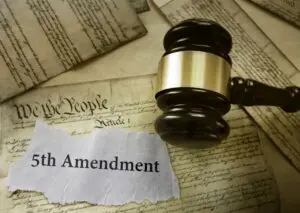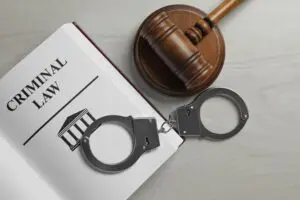How to Refuse to Speak to the Police

When the police question you, your body reacts instantly. Your heart pounds, your palms grow damp, and words may slip out before you’ve had time to think. That natural urge to explain yourself can quickly become the prosecution’s greatest weapon.
Even statements you believe are harmless can be turned against you later. The Constitution protects you with the right to remain silent, shielding you from self-incrimination. Exercising that right effectively often requires guidance.
If you’re approached by police anywhere in North Texas, don’t go through it on your own. Call Whalen Law Office today at (214) 368-2560 to speak with an experienced criminal defense lawyer right away.
Key Takeaways About Refusing Police Questioning in Texas
- The Fifth Amendment protects your right not to incriminate yourself. But you must clearly invoke it. In some pre-arrest questioning, staying silent without saying so can actually be used against you.
- Police must stop questioning once you clearly invoke your right to counsel, but the invocation must be unambiguous.
- Polite but firm language protects your rights without escalating the situation or appearing uncooperative.
- Anything you say before invoking your rights becomes admissible evidence, including casual conversation.
- Keeping your attorney’s contact information handy helps you stay clear-headed during stressful encounters.
Understanding Your Fifth and Sixth Amendment Rights in Texas Police Questioning
 The Fifth Amendment to the U.S. Constitution protects you from being compelled to testify against yourself in any criminal proceeding. This fundamental right applies whether you’re sitting in custody at the Collin County jail, standing on your doorstep in Frisco, or pulled over on Highway 75 heading toward Sherman.
The Fifth Amendment to the U.S. Constitution protects you from being compelled to testify against yourself in any criminal proceeding. This fundamental right applies whether you’re sitting in custody at the Collin County jail, standing on your doorstep in Frisco, or pulled over on Highway 75 heading toward Sherman.
Texas adds another layer of protection. Article I, Section 10 of the Texas Constitution guarantees that “in all criminal prosecutions the accused shall not be compelled to give evidence against himself.” This state-level safeguard reinforces federal rights and applies in every Texas courtroom.
The right to counsel you invoke during police questioning arises under the Fifth Amendment. The Sixth Amendment right attaches once formal charges are filed and applies to all critical stages of prosecution. These protections exist because the framers knew even innocent people might confess under pressure from skilled interrogators.
But beware. In Salinas v. Texas (2013), the U.S. Supreme Court ruled that simply remaining silent during pre-arrest questioning is not enough. Silence can sometimes be used against you unless you clearly invoke your Fifth Amendment right. That is why you must say the words: “I am exercising my right to remain silent.”
Miranda Rights vs. Voluntary Police Encounters in Texas
Miranda warnings come into play only after an arrest. Yet police often ask questions long before taking someone into custody, using that time to collect statements without informing you of your rights. Anything you say in these conversations can later be used by prosecutors.
Texas law also provides its own safeguards. Under Article 38.22 of the Texas Code of Criminal Procedure, most confessions or oral statements made to police during custodial interrogation are inadmissible unless they are electronically recorded and preceded by specific warnings similar to Miranda. Voluntary or spontaneous statements outside interrogation may still be admissible even without a recording.
This statute ensures that improperly obtained confessions cannot be used against you, giving Texans additional protection beyond federal law.
How to Invoke Your Right to Remain Silent with a Texas Defense Attorney
Knowing your rights means nothing if you don’t understand how to properly invoke them during actual police encounters. Courts require very specific language, and using the wrong words may leave you open to continued questioning. Whether your statements can be used at trial often depends on how clearly you invoke your rights.
The Exact Language to Invoke Your Right to Remain Silent
Courts require specific language when invoking your rights. Saying “I think I need a lawyer” or “Maybe I shouldn’t talk” doesn’t stop questioning. Officers continue interrogating suspects who use uncertain language, claiming they didn’t understand whether you actually wanted an attorney.
The most effective phrases leave no room for interpretation. State clearly: “I am exercising my right to remain silent. I want to speak with my attorney before answering any questions.” This direct language creates an unmistakable record that you invoked constitutional protections.
How to Stay Silent After Invoking Your Rights
After invoking your rights, stay silent. Many people correctly ask for attorneys, then immediately start talking again when officers keep asking questions. Once you break your silence, courts may find you waived your previously invoked rights.
Police use various tactics to restart conversations after you invoke your rights. They might claim they’re just making small talk or need basic information.
Remember that any topic leads back to their investigation. Repeat your invocation if necessary: “As I said, I’m exercising my right to remain silent and want my attorney present.”
Common Police Interrogation Tactics and Psychological Pressure in Texas
 Law enforcement officers are trained in psychology and human behavior, using methods designed to push past a person’s hesitation to stay silent. Their aim is to keep you talking, whether by putting you at ease, stirring guilt, or creating fear that silence will make things worse.
Law enforcement officers are trained in psychology and human behavior, using methods designed to push past a person’s hesitation to stay silent. Their aim is to keep you talking, whether by putting you at ease, stirring guilt, or creating fear that silence will make things worse.
Recognizing these tactics can help you stay steady when the pressure rises and you feel the urge to explain yourself. Common approaches include:
- “We’re just trying to help you”: Suggesting cooperation will lead to better treatment.
- False evidence claims: Making you believe proof already exists.
- “Your friend already told us everything”: Creating urgency to share your side.
- Minimization techniques: Downplaying the seriousness of the situation to invite admissions.
- Lengthy questioning sessions: Wearing down your focus and judgment over time.
These strategies succeed because they exploit natural human reactions to stress and authority. A knowledgeable criminal defense attorney understands how they operate and can protect you from being pushed into false or damaging statements.
What Not to Say to Police in Texas Criminal Investigations
Every word you say to law enforcement becomes part of the permanent record, ready to be analyzed and reinterpreted by prosecutors. Even seemingly helpful explanations transform into damaging admissions when presented to a jury months later.
Understanding what not to say protects you from inadvertently providing the evidence prosecutors need to build their case against you.
Why Talking to Police Often Hurts Your Defense
Partial truths and lies both damage your defense. When you provide incomplete information or false alibis, prosecutors use these statements to attack your credibility at trial. Juries assume innocent people tell the truth, making any deception powerful evidence of guilt.
Even truthful statements become problems when taken out of context. Explaining you were near the area seems helpful until prosecutors argue it places you at the crime scene. Your innocent presence can be twisted into something incriminating at trial.
The Danger of Clearing Things Up
Police love suggesting quick conversations to clear things up or get your side of the story. These informal chats feel less threatening than formal interrogations, causing people to let their guard down. However, these conversations carry the same legal weight as sworn statements.
Nothing you tell police informally stays off the record. Officers write detailed reports about every interaction, including your demeanor, exact words, and what they interpret as suspicious behavior. These reports become evidence even when no recording exists.
Word-for-Word Scripts to Refuse Police Questions in Texas
Different situations require different approaches when asserting your rights, but having responses prepared helps you avoid fumbling for words in stressful encounters. These word-for-word scripts give you confidence to protect yourself while remaining respectful and avoiding unnecessary escalation.
Practice these phrases now, because adrenaline and fear make clear thinking almost impossible when police suddenly appear at your door or pull you over.
Scripts for Texas DWI and Traffic Stop Encounters
Traffic stops create unique pressure because Texas law requires drivers to present their license, registration, and proof of insurance when asked (Texas Transportation Code § 521.025). Beyond these documents, you are not required to answer questions about where you’re going, where you’ve been, or what’s in your vehicle.
If you are lawfully arrested, officers may also request your name, address, and date of birth (Texas Penal Code § 38.02). Refusing this identifying information after an arrest can lead to a separate charge, but before arrest you are not obligated to volunteer any details.
When officers ask investigative questions, respond professionally: “Officer, I prefer not to answer questions. Am I free to go?” If detained, add: “I’m exercising my right to remain silent and would like to contact my attorney.” Keep your hands visible and avoid sudden movements while asserting your rights.
How to Respond When Police Come to Your Texas Home or Workplace
When police arrive at your door, you control the interaction more than during street encounters. Unless they have a warrant, you need not let them inside or even open the door. Speaking through the closed door maintains a physical barrier while you determine their purpose.
If officers claim they need to ask a few questions, respond clearly: “I don’t answer questions without my attorney present. Please leave your contact information, and my lawyer will be in touch.” Then close the door.
Don’t feel obligated to explain further or justify your decision. Keep in mind that officers may enter without a warrant if exigent circumstances exist, such as hot pursuit, an immediate threat to safety, or the risk of evidence destruction.
What to Say When You’re Arrested or Detained in Texas
Being arrested intensifies the pressure to talk. Officers may suggest that cooperation helps your case or that refusing to talk makes things worse. Neither claim is true. Your attorney negotiates better outcomes than anything you might say during arrest.
State your invocation immediately after arrest: “I am invoking my right to remain silent and my right to an attorney.” Then stop talking completely. Don’t discuss the charges, explain misunderstandings, or make small talk during transport or booking.
Protecting Your Federal and State Rights with a North Texas Criminal Defense Lawyer
Police departments across North Texas use different tactics. Some take a hard, confrontational approach, while others use a friendly tone that makes it feel like a casual conversation. Regardless of how they question you, your constitutional rights never change.
Federal agencies like the FBI, DEA, and IRS bring far more preparation. Their agents may investigate for months or years before making contact, often showing up with detailed background information designed to push for a quick confession.
Understanding how both local and federal officers operate helps you stay prepared. Whether it’s a traffic stop in Frisco, an investigation by the Texas Rangers, or federal agents serving a warrant in downtown Dallas, keeping a defense lawyer’s number in your phone gives you immediate protection when you need it most.
What Happens After You Invoke Your Right to a Criminal Defense Lawyer
 Once you clearly invoke your rights, police might take several different actions depending on their investigation’s status and the evidence they’ve already gathered.
Once you clearly invoke your rights, police might take several different actions depending on their investigation’s status and the evidence they’ve already gathered.
They may decide to arrest you immediately, release you pending further investigation, or hold you while seeking search or arrest warrants from a judge. Each scenario calls for a different response, but you must remain silent no matter what happens next or how officers try to restart the conversation.
Some officers claim that invoking rights shows guilt or makes you look suspicious. This psychological pressure means nothing legally.
Once you are in custody, have received Miranda warnings, and clearly invoke your rights, prosecutors cannot argue at trial that your silence is evidence of guilt. However, silence during voluntary, pre-arrest questioning may sometimes be used against you unless you explicitly invoke your Fifth Amendment privilege.
Contact your criminal defense lawyer immediately after any police encounter. Even if officers release you without charges, their investigation likely continues. Early legal intervention prevents future mistakes and protects you from ongoing surveillance or subsequent contact attempts.
How Whalen Law Office Protects Your Constitutional Rights
Police encounters happen when you least expect them. Whether federal agents knock on your door in Frisco or state troopers pull you over near Lake Texoma, you need attorneys who understand both the law and local law enforcement tactics. Whalen Law Office brings nearly four decades of criminal defense experience to protect clients throughout Texas and nationwide.
James P. Whalen and Ryne T. Sandel have represented thousands of clients who spoke to police before calling a lawyer. They know how prosecutors twist innocent words into confessions. More importantly, they understand how to suppress illegally obtained statements and protect your rights from the moment you call.
Your Criminal Defense Lawyer as Your Shield
Our attorneys serve as the barrier between you and law enforcement. Once you invoke your right to counsel, all questioning must go through us. This protection prevents officers from using psychological pressure, confusion tactics, or your own nervousness against you.
The firm’s flat-fee structure means you get unlimited access to your criminal defense lawyer without worrying about hourly charges during police investigations. Day or night, our team stands ready to intervene when law enforcement contacts you.
We handle communications with detectives, federal agents, and prosecutors while you focus on your family and future.
FAQs for Criminal Defense Lawyers
What if police say refusing to talk makes me look guilty?
After you are Mirandized and clearly invoke your right to silence, that silence cannot be used as evidence of guilt at trial. However, if you remain silent before arrest without invoking your Fifth Amendment right, some courts allow prosecutors to argue that your silence indicates guilt.
The Constitution protects your right to remain silent precisely because innocent people need protection from self-incrimination. Looking “guilty” to officers means nothing compared to protecting your legal rights.
Do I need to wait for arrest before calling a lawyer?
No, you may contact an attorney anytime police question you about criminal matters. Early legal representation prevents damaging statements and protects your interests from the investigation’s beginning.
What if officers threaten to arrest me if I don’t cooperate?
Police may arrest you based on probable cause regardless of cooperation. Talking doesn’t prevent arrest but does provide evidence for conviction. Let them make arrest decisions based on existing evidence rather than your statements.
What information must I provide to police?
During traffic stops, provide license, registration, and insurance. If arrested, you must provide identifying information for booking. Beyond these requirements, you need not answer any questions about alleged criminal activity.
How do I refuse field sobriety tests politely?
Simply state: “I prefer not to perform any field sobriety tests.” Field sobriety tests are voluntary in Texas, but officers may still arrest you if other indicators of impairment exist. Prosecutors may also introduce refusal evidence at trial.
You may face license suspension for refusing chemical tests such as breath or blood tests, but field sobriety tests themselves do not carry automatic penalties. Your criminal defense lawyer advises on the best approach for your specific situation.
Stand Firm and Contact a Texas Criminal Defense Lawyer Immediately
What you say to police can shape the entire course of your case. The sense of relief that comes from explaining yourself in the moment often transforms into damaging evidence later in court. Protecting your future means relying on your constitutional rights, not trying to explain your way out.
When the pressure is high, your freedom depends on making choices that protect you, not the investigators. Trained officers know how to steer conversations to their advantage, which is why you should never face them on your own.
With experienced criminal defense lawyers prepared to safeguard your rights, the best step you can take is to contact Whalen Law Office at (214) 368-2560 before speaking with police about any criminal matter in North Texas.